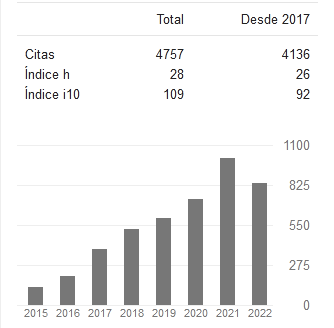Desempeño escolar basado en indicadores de salud de los estudiantes de Educación Secundaria
Palabras clave:
Educación Secundaria, desempeño escolar, indicadores de saludResumen
La investigación sobre el desempeño escolar basado en indicadores de salud de los estudiantes de Educación Secundaria es una temática que ha sido abordada desde hace varios años, sin embargo, la novedad radica en la necesidad de abordarla de manera integral y multidisciplinaria, considerando no solo la dimensión académica, sino también la dimensión de la salud de los estudiantes. En la actualidad, hay una creciente preocupación por la salud y el bienestar de los estudiantes, y se reconoce que la salud y el desempeño académico están estrechamente relacionados. Por lo tanto, investigar sobre el desempeño escolar basado en indicadores de salud de los estudiantes de Educación Secundaria es una temática relevante y novedosa en el campo de la educación y la salud pública. Además, el desarrollo de tecnologías de la información y la comunicación ha permitido la recopilación y análisis de grandes cantidades de datos, lo que brinda la oportunidad de llevar a cabo investigaciones más precisas y exhaustivas en este campo. Asimismo, la integración de diferentes disciplinas como la medicina, la psicología, la pedagogía y la epidemiología, entre otras, ha permitido una comprensión más amplia y compleja de la problemática del desempeño escolar basado en indicadores de salud. La población en este caso son los estudiantes de la Secundaria Valentín Gómez Farías, Chetumal, Quintana Roo, México. La muestra es aleatoria simple de estudiantes. Además, se pudo verificar que la investigación en este tema puede contribuir a mejorar el proceso de desempeño escolar de los estudiantes en la institución
Descargas
Citas
Aguilar, J. A., Márquez, M. C. y Flores, M. (2018). Modelo integral de indicadores de salud para el desempeño escolar de los estudiantes de educación secundaria en México. Revista de investigación en salud pública, 8(3), 126-135.
American Academy of Pediatrics. (2018). The role of the pediatrician in promoting healthy lifestyles for children and adolescents. Pediatrics, 141(2), e20173796. doi: 10.1542/peds.2017-3796
Castro Miranda, G. y Calzadilla Vega, G. (2021). La comunicación asertiva. Una mirada desde la psicología de la educación. Didasc@lia: didáctica y educación, 12(3), 131-151.
Coe, N. B., von Hippel, P. T., Bellows, L., & Flores, G. (2018). Does good health make for better students? Evidence from school-entry health screenings. Economics of Education Review, 62, 1-14. doi: 10.1016/j.econedurev.2017.10.008
De Oliveira, J. C. S., De Oliveira, L. S., Da Silva, T. J., & Borges, J. F. (2018). School-based interventions for improving the quality of secondary education in Brazil: A systematic review. Journal of Education and Development, 32(2), 15-33.
Gamboa Graus, M. E. (2018). Estadística aplicada a la investigación educativa. Dilemas Contemporáneos: Educación, Política y Valores, 5(2).
Gamboa Graus, M. E. (2019a). Axiología en los contenidos como organizador del currículo en la pedagogía desarrolladora. Didasc@lia: didáctica y educación, 10(6), 195–211.
Gamboa Graus, M. E. (2019b). La zona de desarrollo próximo como base de la pedagogía desarrolladora. Didasc@lia: didáctica y educación, 10(4), 33–50.
Gamboa Graus, M. E. (2022). Escalas de medición estadística. Didasc@lia: didáctica y educación, 13(1), 341-366.
García-Cabrera, L., Rojas-Abad, C., & Suárez-Flores, F. (2018). Health, school performance and education quality: Evidence from Mexico. Cogent Economics & Finance, 6(1), 1512369. doi: 10.1080/23322039.2018.1512369
Holmes, C. J., Kim-Spoon, J., Deater-Deckard, K., & Lee, J. (2019). Linking adolescent health risk behavior with academic performance: The mediating role of academic motivation. Journal of Youth and Adolescence, 48(6), 1153-1165. doi: 10.1007/s10964-019-01031-3
Jiménez-Cruz, A., Bacardí-Gascón, M., & Pichardo-Ontiveros, E. (2017). Nutrition and physical activity programs for obesity treatment (PRONAF study): Methodology of a randomized clinical trial. BMC Public Health, 17(1), 66. doi: 10.1186/s12889-016-3934-4
Kahan, D., Allen, J., & Srivastav, A. (2018). Health policies and school-based programs. Journal of School Health, 88(5), 339-345.
Nava, G. (2018). La influencia de los factores sociales en el desempeño escolar de los estudiantes de educación secundaria. Revista mexicana de investigación educativa, 23(79), 813-836.
Pantoja Burbano, M. J., Enríquez Chugá, J. F., Rocío Álvarez Hernández, S. D., & Cuaran Guerrero, M. S. (2020). Adicción al internet y su influencia en el desempeño escolar y social de una muestra de adolescentes de la ciudad de Ibarra. Dilemas Contemporáneos: Educación, Política y Valores, 8(1).
Wang, D., & Chen, Y. (2019). Effectiveness of school health programs in improving students’ health behaviors and outcomes: A review of the literature. Journal of School Health, 89(10), 776-793.
Publicado
Cómo citar
Número
Sección
ARK
Licencia
Derechos de autor 2023 Gloria Dolores May Cocom

Esta obra está bajo una licencia internacional Creative Commons Atribución 4.0.
Usted es libre de:
- Compartir — copiar y redistribuir el material en cualquier medio o formato
- Adaptar — remezclar, transformar y construir a partir del material para cualquier propósito, incluso comercialmente.
Bajo los siguientes términos:
- Atribución — Usted debe dar crédito de manera adecuada, brindar un enlace a la licencia, e indicar si se han realizado cambios. Puede hacerlo en cualquier forma razonable, pero no de forma tal que sugiera que usted o su uso tienen el apoyo de la licenciante.
- No hay restricciones adicionales — No puede aplicar términos legales ni medidas tecnológicas que restrinjan legalmente a otras a hacer cualquier uso permitido por la licencia.













































